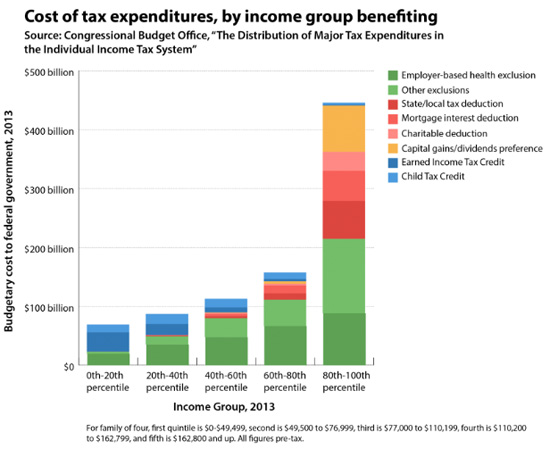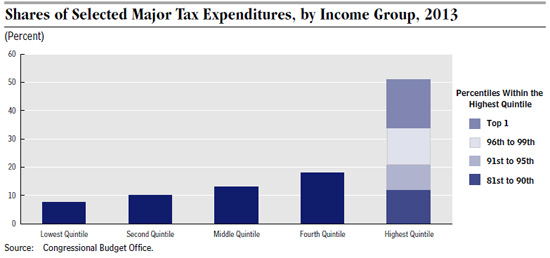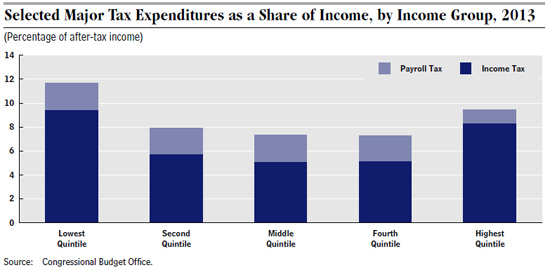CBO Study Shows Tax Breaks Favor the Rich
Every year, tax expenditures--Uncle Sam's myriad credits, exclusion, loopholes and breaks--cost the U.S. Treasury over $1 trillion a year. To put that in perspective, that figure is greater than the cost of Medicare, Social Security and national defense. Much larger than this year's projected budget deficit of $642 billion, tax expenditures equal roughly 30 percent of federal spending. It's no wonder why Republicans are so fond of calling for closing loopholes while lowering rates to produce "revenue-neutral" tax reform.
But a new study of the top 10 tax expenditures also show why GOP leaders including Mitt Romney, Paul Ryan, and House Ways and Means Committee Chairman Dave Camp refuse to name a single loophole they would close to achieve it. As the new Congressional Budget Office (CBO) analysis shows, half the value of those $900 billion in tax breaks goes to the top quintile of American income earners. Nevertheless, their elimination would devastate lower and middle income households.
The CBO review of the ten largest expenditures in the individual tax system shows the big numbers at stake. As the National Journal explained:
The top 10 most expensive tax expenditures will cost the federal government roughly $900 billion in 2013, according to CBO--and close to $12 trillion over the next several years through 2023. That's about 5.4 percent of the gross domestic product.
By far, the biggest-ticket item goes to the break for employers that offer health insurance; that expenditure alone reduces the tax rolls by $260 billion in 2013, according to CBO. Among the most expensive breaks are also ones much beloved by Americans, including breaks for mortgage-interest payments, charitable contributions, and state and local taxes. Their popularity makes it difficult politically for lawmakers to consider cutting or reducing them.
Many of those breaks, it turns out, largely benefit the richest 20 percent of households, which for a family of four starts at an income of $162,000 a year. For example, 84 percent of the $39 billion written off this year for charitable contributions go to the top 20 percent. (38 percent of that goes to the top 1 percent.) A staggering 93 percent of the $161 billion a year in preferential treatment for capital gains and dividends income is delivered to the top quintile, with two-thirds of that going to the top 1 percent. The Washington Post chart above and the CBO graph below tell the tale:
But while the well-to-do pocket over half of the windfall produced by the numerous breaks in the tax code, the standard of living of lower-income working families is much more dependent on them. The Earned Income Tax Credit (EITC), which President Ronald Reagan called "the best anti-poverty, the best pro-family, the best job creation measure to come out of Congress," provides almost all of $61 billion in annual benefits to the bottom 60 percent of taxpayers. Overall, the major expenditures account for almost 12 percent of the income for the bottom quintile of earners.
It was this dynamic that blew up Mitt Romney's tax plan during the 2012 presidential election. That is, while the rich get the lion's share of the tax breaks, the dollar value simply isn't enough to pay for lower tax rates without also punishing working families. As the nonpartisan Tax Policy Center found, even after assuming the closure of tax loopholes and deductions which disproportionately favor the rich, President Romney would have cut taxes for the richest five percent of earners while increasing the tax bill for the other 95 percent of Americans. It's no wonder Ezra Klein concluded that "'broadening the base and lowering the rates' is anti-family tax reform," adding:
"The size of the tax cut he's proposing for the rich is larger than all of the tax expenditures that go to the rich put together. As such, it is mathematically impossible for him to keep his promise to make sure the top one percent keeps paying the same or more."
All of which is why so-called "revenue neutral tax reform" is such a potentially dangerous idea. And it's also why Republican "reformers" and their Democratic enablers like Max Baucus don't want to discuss the details in public.





There is simply no data to support the supposition that providing disproportionately huge tax cuts for the top 2% of the wealthiest people results in job creation or other significant economic growth.
Enter the Congressional Republican think tank: since the GW Bush era mega-tax breaks for the wealthy clearly had no stimulating effect on job growth, they concluded that we needed to further extend said tax cuts indefinitely in order to stimulate job growth.
In reality, the only result that the GOP truly expects is the one that did occur -- the rich got richer at the expense of everyone else.
Suggestions that tax cuts for the ultra-wealthy will stimulate job growth was simply their cover, their disingenuous talking point designed to try to sell their Reaganomic bill of goods to the public.
Ultra-wealthy Americans made a major investment in the Republican Party during the 2010 mid-term elections, and hundreds of millions of additional dollars were invested in Republican candidates in the 2012 presidential and congressional campaigns. The GOP has been simply carrying out the job for which they have been duly paid.
Most fiscal conservatives are primarily interested in two outcomes:
1) Increasing the income divide between the wealthiest Americans and the rest of society
2) Increasing profit margins for corporations via lowered taxes and minimized environmental and workplace regulations
Reducing unemployment is a secondary issue -- if said corporations opt to use their increased profits to hire additional employees, that's their prerogative.
Alas, historical evidence overwhelming demonstrates that increased corporate profits do not translate into increased hiring -- increased demand for goods and services does.
And, of course, increased demand requires increased purchasing power by that subset of society which does the majority of the purchasing, i.e., the middle class.
So let's see.
Tax breaks for uber-millionaires so that they can buy a couple more imported luxury cars or extend their European vacation by a couple of weeks? Good for America.
Tax breaks for middle class families so that they can pay the mortgage, gas up the car, and/or send their kids to college? Bad for America.
It's not about whether or not to generate additional tax revenue. It's all about which subset of Americans can provide the extra revenue with the least detrimental impact on their essential needs.
Don't pee on my shoe and call it trickle-down economics.